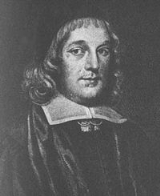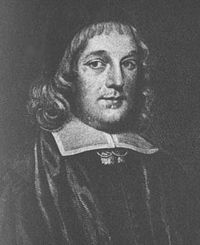
Thomas Manton
Encyclopedia

Puritan
The Puritans were a significant grouping of English Protestants in the 16th and 17th centuries. Puritanism in this sense was founded by some Marian exiles from the clergy shortly after the accession of Elizabeth I of England in 1558, as an activist movement within the Church of England...
clergyman.
Life
Thomas Manton was baptized March 31, 1620 at Lydeard St LawrenceLydeard St Lawrence
Lydeard St Lawrence or St Lawrence Lydiard is a village and civil parish in Somerset, England, situated north west of Taunton in the Taunton Deane district. The village has a population of 416...
, Somerset
Somerset
The ceremonial and non-metropolitan county of Somerset in South West England borders Bristol and Gloucestershire to the north, Wiltshire to the east, Dorset to the south-east, and Devon to the south-west. It is partly bounded to the north and west by the Bristol Channel and the estuary of the...
, a remote southwestern portion of England. His grammar school education was possibly at Blundell's School
Blundell's School
Blundell's School is a co-educational day and boarding independent school located in the town of Tiverton in the county of Devon, England. The school was founded in 1604 by the will of Peter Blundell, one of the richest men in England at the time, and relocated to its present location on the...
, in Tiverton, Devon. His formal education came at Wadham College, University of Oxford
University of Oxford
The University of Oxford is a university located in Oxford, United Kingdom. It is the second-oldest surviving university in the world and the oldest in the English-speaking world. Although its exact date of foundation is unclear, there is evidence of teaching as far back as 1096...
, and he eventually graduated BA in 1639 from Hart Hall. Joseph Hall, bishop of Norwich
Bishop of Norwich
The Bishop of Norwich is the Ordinary of the Church of England Diocese of Norwich in the Province of Canterbury.The diocese covers most of the County of Norfolk and part of Suffolk. The see is in the City of Norwich where the seat is located at the Cathedral Church of the Holy and Undivided...
, ordained him deacon
Deacon
Deacon is a ministry in the Christian Church that is generally associated with service of some kind, but which varies among theological and denominational traditions...
the following year: he never took priest's orders, holding that he was properly ordained to the ministerial office.
Ministries at Sowton and Colyton (1640–1645)
He was then appointed town lecturer of Sowton
Sowton
Sowton is a village and civil parish east of Exeter in East Devon, England. It has a population of 639.Its parish council merged with that of nearby Clyst St Mary in 1976 to form Bishop's Clyst.Sowton is also the name of an industrial estate at...
in Devon
Devon
Devon is a large county in southwestern England. The county is sometimes referred to as Devonshire, although the term is rarely used inside the county itself as the county has never been officially "shired", it often indicates a traditional or historical context.The county shares borders with...
, where he served from 1640–1643, and at Colyton, Devon
Colyton, Devon
Colyton is a small town in Devon, England. It is located within the East Devon local authority area. It is 3 miles away from Seaton and 6 miles away from Axminster. Its population in 1991 was 2,783.-History:...
, from 1643-1645.
Ministry at Stoke Newington (1645–1656)
In July 1645 he moved from the rural western counties to the London area, as Colonel Alexander Popham, the patron of St. Mary’s parish, brought him east to the tiny town of Stoke Newington
Stoke Newington
Stoke Newington is a district in the London Borough of Hackney. It is north-east of Charing Cross.-Boundaries:In modern terms, Stoke Newington can be roughly defined by the N16 postcode area . Its southern boundary with Dalston is quite ill-defined too...
, in Middlesex
Middlesex
Middlesex is one of the historic counties of England and the second smallest by area. The low-lying county contained the wealthy and politically independent City of London on its southern boundary and was dominated by it from a very early time...
county, outside London proper. Here he began his major mid-week lectures, first on Isaiah 53 (mid-1640s), then on James (end of 1640s), and finally on Jude (late 1640s–early 1650s). While at Stoke Newington he was invited to preach before Parliament for the first of at least six occasions on June 30, 1647, which was a fast day for Parliament. His sermon was based on Zechariah 14:9 and entitled, “Meat out of the Eater; or, Hopes of Unity in and by Divided and Distracted Times.” Exactly one year later, on June 30, 1648, he preached another fast sermon on Revelation 3:20, “England’s Spiritual Languishing; with the Causes and the Cure.” He also participated in the Westminster Assembly
Westminster Assembly
The Westminster Assembly of Divines was appointed by the Long Parliament to restructure the Church of England. It also included representatives of religious leaders from Scotland...
as one of three clerks, was later appointed to write a preface to the second edition of the Westminster Confession in 1658, and served Oliver Cromwell
Oliver Cromwell
Oliver Cromwell was an English military and political leader who overthrew the English monarchy and temporarily turned England into a republican Commonwealth, and served as Lord Protector of England, Scotland, and Ireland....
as a chaplain and a trier (an overseeing body that examined men for the ministry).
Ministry at Covent Garden (1656–1662)
In 1656 he moved to London as he was appointed as a lecturer at Westminster Abbey and most importantly as rector of St. Paul’s, Covent Garden, succeeding Obadiah Sedgwick. During this time Cromwell died and England entered a period of great uncertainty. This led Presbyterians such as Manton to call for the restoration
English Restoration
The Restoration of the English monarchy began in 1660 when the English, Scottish and Irish monarchies were all restored under Charles II after the Interregnum that followed the Wars of the Three Kingdoms...
of Charles II in 1660, traveling along with others to Breda, The Netherlands, to negotiate his return. After Charles returned, Manton was part of the negotiations called the Savoy Conference, in which the scruples of the Presbyterians and Congregationalists concerning the Prayer Book were formally discussed. Yet since the Cavalier Parliament was filled with Laudians, 1662 saw the enactment of the Act of Uniformity 1662
Act of Uniformity 1662
The Act of Uniformity was an Act of the Parliament of England, 13&14 Ch.2 c. 4 ,The '16 Charles II c. 2' nomenclature is reference to the statute book of the numbered year of the reign of the named King in the stated chapter...
. All ministers were to be ordained or re-ordained by a bishop, they were to renounce the Solemn League and Covenant, promise loyalty to the Prayer Book, and subscribe the Thirty-Nine Articles. Since Manton was on favorable terms with Charles II he was offered the Deanery of Rochester, but he refused on conscience grounds.
Post-Ejection (1662–1677)
Manton’s last years were tumultuous. The Act of Uniformity led to the "Great Ejection." On August 17, 1662, Manton preached his last sermon at Covent Garden on Hebrews 12:1. He also continued to write even when imprisoned for refusing to cooperate for six months in 1670 in violation of the Conventicle Act. 1672 saw the Declaration of Indulgence, in which men like Manton were granted a license to preach at home. Manton then became a lecturer at Pinner’s Hall for the so-called “morning exercises.” Parliament, though, revoked this Indulgence the year after. Manton would later die on October 18, 1677, and was survived by his wife and three children.
Works
Although Manton is little known now, in his day he was held in as much esteem as men like John OwenJohn Owen (theologian)
John Owen was an English Nonconformist church leader, theologian, and academic administrator at the University of Oxford.-Early life:...
. He was best known for his skilled expository preaching, and was a favourite of John Charles Ryle
John Charles Ryle
John Charles Ryle was the first Anglican bishop of Liverpool.-Life:Ryle was born at Macclesfield, and was educated at Eton and at Christ Church, Oxford, where he was Craven Scholar in 1836...
, who championed his republication in the mid-19th century, and Charles Spurgeon
Charles Spurgeon
Charles Haddon Spurgeon was a large British Particular Baptist preacher who remains highly influential among Christians of different denominations, among whom he is still known as the "Prince of Preachers"...
. Of Manton, Ryle said he was "a man who could neither say, nor do, nor write anything without being observed." Spurgeon said his works contained “a mighty mountain of sound theology” and his sermons were “second to none” to his contemporaries. He went on to say, “Manton is not brilliant, but he is always clever; he is not oratorical, but he is powerful; he is not striking, but he is deep.”
His finest work is probably his Exposition of James.
External links
- The Complete Works of Thomas Manton - freely read - 22 PDF
- The Complete Works of Thomas Manton–22 hardcover books
- Commentary on James
- Commentary on Jude
- Sermons on Hebrews 11
- Single volume on The Temptation of Christ
- Single volume on The Life of Faith
- An Interview with Derek Cooper About Thomas Manton
- "Who Was Thomas Manton?" (Audio Lecture)
- The Complete Works of Thomas Manton–CD from Logos Bible Software
- The Thomas Manton Homepage

